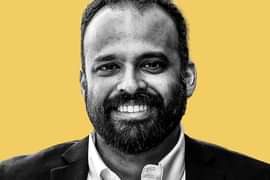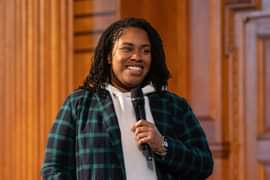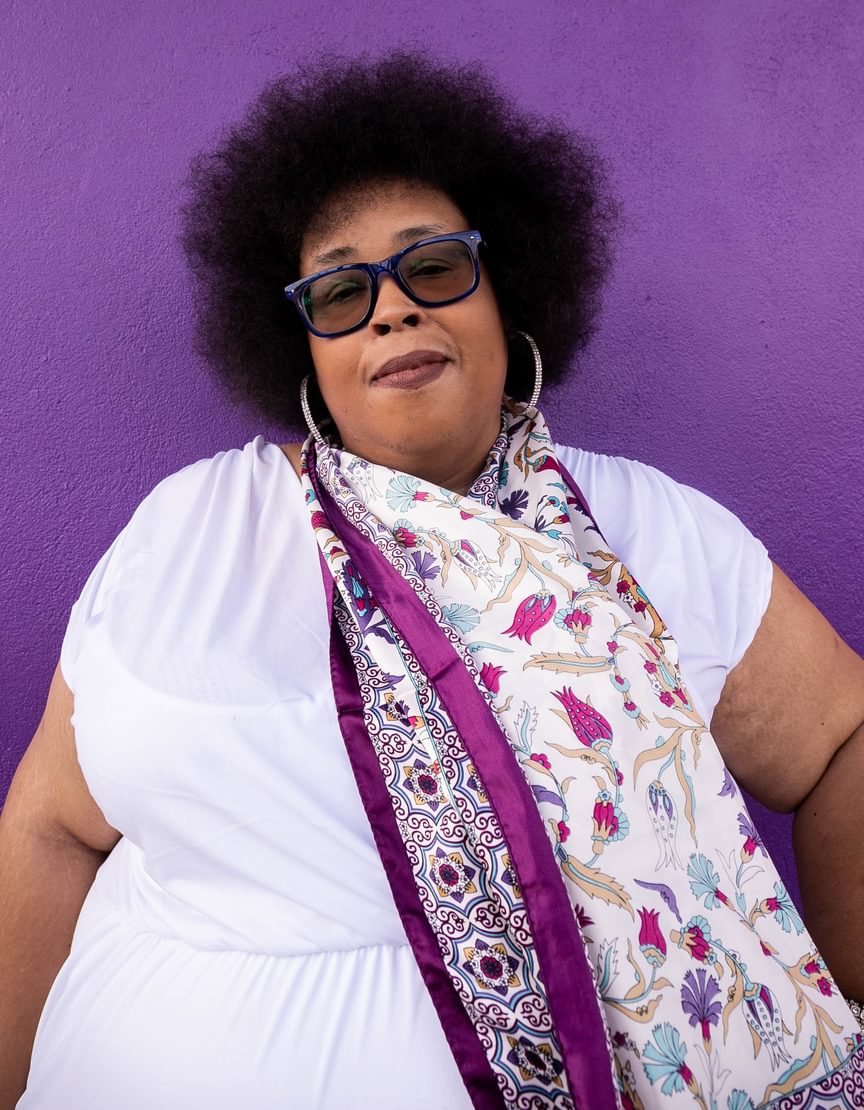
August 20, 2021
The folk rock diva of New Orleans
Lilli Lewis ’93 doesn't miss a beat on the power of music to uplift communityby Rita Savard
The year 2020 was a tumultuous one that saw the onset of a deadly pandemic and widespread protests over systemic racism. Enter Lilli Lewis. For as long as she can remember, the singer/songwriter/activist—aka “The Folk Rock Diva” of New Orleans—has been following her joy. And in a year that tested us beyond measure, this joy artist notes that collective action—with some feel-good music sprinkled in— also woke many people up to making radical changes.
Music was as natural as breathing in Lewis’s childhood home. Her parents, Judy and John, exposed her to everything from roots and gospel to jazz and classical. When her sister, Michelle, started taking piano lessons, 3-year-old Lewis could play whatever her older sibling was learning just by listening in.
“There was an utter love for music,” Lewis says. “That’s what
I was always aware of. It lit me up from the inside, made me feel safe, feel the full expanse of possibility, and made me feel
connected to people with whom I didn’t have a shared common
language.”
Lewis chose Andover because of “all the beautiful pianos.” At PA, Music Department Chair William Thomas worked pieces like Mozart’s Requiem “past your brain, past your blood, and into your bones,” Lewis says, her lips curving up into a wide smile. “He was joy and sass—and totally demanding—but he made miracles through music.”
Lewis’s original music has been praised by critics as “the most mesmerizing and soul touching combination of jazz, blues, gospel, and field folk magic imaginable.” Not long after she moved to New Orleans with her wife, Liz, Lewis started working for Louisiana Red Hot Records in 2015. Today she is the label’s VP and A&R head, charged with finding and developing talent.
We’re in a new moment that is opening doors and improving our emotional intelligence.
”Throughout her career, Lewis has used music as a vehicle to inspire connection and bring deeper awareness of critical issues. Since March 2020, she has lent her voice to make an impact for the greater good, working with the Movement Voter Project, a national organization aiming to increase voter turnout in Lewis’s home state of Georgia; teaming up with New Orleans musicians and writing the fun but important song for Mask Up!, a public health-awareness campaign to stem the spread of COVID-19; designing the Committing to Conversation Initiative for music industry nonprofit Folk Alliance International, which created online safe spaces for people to unpack their anxieties and experiences about race, cultural equity, and social justice; and creating an album and releasing the single “My American Heart,” which she performed as a powerful finale at the Kennedy Center’s Arts Across America Series: New Orleans Voices on Social Justice.
The toxic traditions of injustice and inequality in America— and in American music and art—are no secret. But Lewis feels a shift happening. Last year, she was invited by the Americana Music Association to host discussion panels about Black equity, and the events were covered by Billboard and Rolling Stone.
“It made a moment,” Lewis says. “It was a chance for us to say what the music industry could look like in these genres that have been identified as white spaces.”
Country music is also turning a corner. “There’s an entirely new conversation happening now around Black artists in Nashville,” Lewis says, adding that just this year, several Black artists have been launched and charted in Nashville, including her last single, “Wrecking Ball,” which was picked up for the country music playlist and deemed “country funk.”
“I’ll take it,” she says. “That is a function of 2021—a function of we’ve had enough and for those of us who have been holding our tongues and trying to frame our narratives in a way that was safe and manageable for people who just didn’t want to hear it—we’re in a new moment that is opening doors and improving our emotional intelligence.”
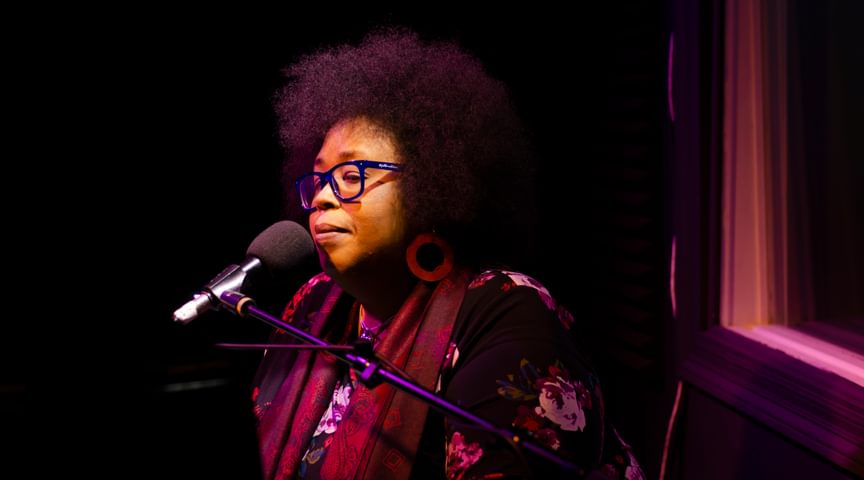
WHAT'S YOUR ANDOVER STORY?
Coming to Andover from Athens, Georgia, it took much longer to unpack the cultural differences than I had expected. My freshman year, suddenly it’s October and it’s snowing! But outside of things like that, I grew up with the myth that racism is a Southern problem. I discovered pretty quickly that racism is not limited by geographical boundaries. At the time, we had a little bit of a skinhead flare-up. There were some anxieties I picked up there that stay with me. But the most remarkable change for me was music. Even when I came to visit Andover, prior to committing, William Thomas was chair of the music department and I remember peeking into a room where the most beautiful sound I heard was coming from. It was him playing the cello. When I told him how much I loved what I heard, and we got to talking about music, he made me sing something trite for him—it could have been the alphabet—then said that he’d like to have me in his choir. Andover gave me this invitation to music right out of the gate that I hadn’t experienced before. My first concert at Andover was a chamber music concert, where they played music that was transcendental. They ended the first half of the concert with the Shostakovich Piano Trio and my insides were quaking. After it ended, I ran down the stairs of the recital hall to tell a friend I’d just met about my excitement while he was running up the stairs to do the same thing. Our minds had exploded. My skin was tingling, colors were dancing in my brain. They also performed a movement from a Gabriel Faure´ Piano Quartet, and to this day, I refer to him as my “Big Daddy.” He’s the composer who matches my inside parts most directly—like points of magic. My whole life, I’ve followed the thing that made me feel that way. Joy is the great equalizer in my world. When you follow your joy, it’s difficult to deeply internalize off-center messages.
WHAT DID YOU LEARN AT ANDOVER THAT STILL BENEFITS YOU TODAY?
We do not pursue excellence as a weapon. Excellence, in its best form, is service to others.
WHAT WAS THE STRONGEST INFLUENCE YOU HAD WHEN GROWING UP?
Michael Jackson’s Thriller was the first album I had that was exclusively mine—a birthday present form my sister. From there I graduated to New Edition—they were like the junior version of The Jackson Five. When I was In elementary school, my sister got to go to New Edition’s Indie Heartbreak Tour concert. My mom told me I couldn’t go until I was older. I was so upset. I remember her telling her by that time, they wouldn’t be New Edition anymore—they’d be ‘Old’ Edition! Despite my protest, as a consolation prize, my mom took me to see the Atlantic City Orchestra. I wasn’t happy. But then they launched into some Bach suite and I’ll never forget the harpist. I was fully mesmerized. Just beside myself. And all the feels I got in that moment, for that music, never changed. My interest in New Edition waned considerably after that concert. The other incredibly impactful influence was my dad’s church. He received his education at Princeton and later, became a minister at a small Baptist church. The old rickety room he gave his sermons in could fit maybe 100 people, with hardwood flooring that we would stomp our feet on and you could feel the whole room vibrate. Every service would start out by moaning and intoning. There was some kind of hint of ancient mojo in that mess. That’s where I met my first piano, first organ, first choir—where I figured out I could read the harmony parts along with the melody. I was informed by that old esthetic where we were still singing 100-year-old songs and finding our own voices inside them.
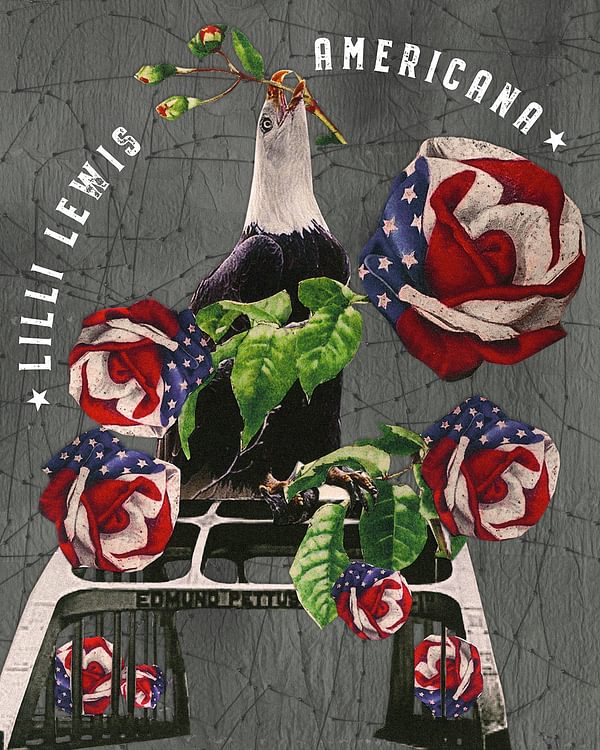
Where is your art taking you next?
I am gradually opening up to live shows again. I’m looking forward to the possibility of touring again in fall and winter, if we are in a place to do so. I released an EP this year and the record that pulls those songs together is scheduled to come out on October 29, 2021. It's called Americana, and it pretty much sums up what it has meant to be me.
Follow Lilli Lewis's music at www.lillilewis.com




